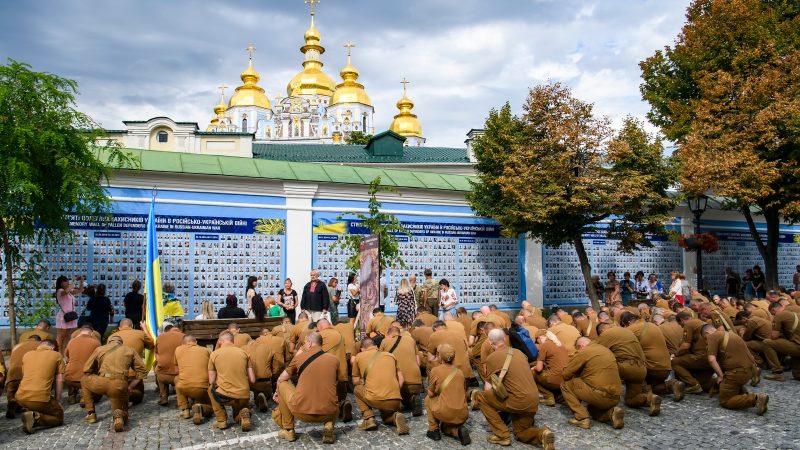
The Memory Wall of Fallen Defenders in Kyiv is a powerful testimony to the human costs of Russian aggression against Ukraine. It is covered by the faces – many barely in their twenties – of those killed since the conflict in Donbas began in 2014, when Russia proxies took control of eastern parts of the country, alongside Vladimir Putin’s illegal annexation of Crimea.
During our visit this month, one veteran at the Wall told us that the pain of losing so many friends is agonising but he takes strength from knowing that they are proudly commemorated as fallen heroes. The current troop buildup on Ukraine’s borders is extremely serious, but Russian aggression is not new and has taken many forms. Cyber-attacks, the targeting of critical infrastructure, an intense disinformation campaign and repeated provocation. It has become part of everyday life.
Russia under Putin is an autocracy with little regard for international law or human rights, either at home or abroad. Corruption is rampant and discrimination against minorities, such as LGBT communities, is encouraged. The Russian government has murdered dissidents, used chemical and radiological weapons to kill people on British soil, propped up brutal dictators from Belarus to Syria, and launched cyber-attacks against British government departments and organisations developing Covid-19 vaccines.
Ukraine is a sovereign and independent country on a democratic journey. It is currently not part of the EU or NATO, but Russia’s actions have driven rising public support for membership of both. National identity has grown, and Ukrainians are resolutely determined to choose their own future.
They have been pursuing reforms to elections, the rule of law and the judiciary. While there is certainly more to do, this progress clearly worries Putin. We must ensure that, along with protecting Ukraine’s sovereignty and territorial integrity, this democratic momentum is protected too. And, as we pledged to the Ukrainian anti-corruption campaigners we met, we must play our part by cracking down on corrupt oligarchs and dirty money at home.
Russia has made repeated promises to respect Ukraine. Most importantly, it signed the Budapest Agreement in 1994 with Ukraine, the UK and the US, which said that in exchange for Ukraine giving up its nuclear weapons, its borders and independence would be guaranteed.
This deal made the whole of Europe safer, but by allowing Russia to renege on its promise, the future of nonproliferation and nuclear disarmament could be undermined. We already face a growing crisis within arms control and delays to the Non-Proliferation Treaty Review Conference. Russia running roughshod over the Budapest Memorandum sends a dangerous message to states we want to dissuade from pursuing nuclear weapons.
We must not believe Russia’s assertions that NATO is responsible for escalation. It is a defensive alliance based on security and progressive values. Its founding treaty enshrines the principles of democracy, individual liberty, and the rule of law, alongside collective security. Clement Attlee’s post-war Labour government was instrumental in the foundation of NATO, and our commitment to it remains unshakeable.
NATO’s unity against Russian aggression was demonstrated at the recent NATO-Russia Council, when all 30 members spoke to reject Russia’s demands and support Ukraine. This international unity – inside and outside NATO – must be maintained, especially if economic and financial sanctions are needed.
Talking is always better than fighting, and we support vital diplomatic efforts to de-escalate this crisis. It was welcome that meetings between the US and Russia took place last week in Geneva, which US Secretary of State Antony Blinken called “frank and substantive” and said should lead to further talks.
We were told many times during our visit how highly Ukraine values UK military training, and how troops bring out their British Operation Orbital training certificate when asked about the best help they have had. With the recent rising Russian threats, Britain is right to step up military support for Ukraine to defend itself, as we have been doing since 2015, which is why we backed the delivery of new short-range defensive weaponry last week.
These are dangerous days for security in Europe – especially for the Ukrainian people. Even at this 11th hour, we hope deeply that diplomacy, sound judgment and respect for international law will prevail with President Putin. We do not want more faces to be added to the Wall in Kyiv.
More from LabourList
‘Welfare reforms still mean a climate of fear. Changes are too little, too late’
Welfare bill: Which MPs are still voting against reforms?
‘The tap end is getting hotter – and Welsh Labour might get burned’